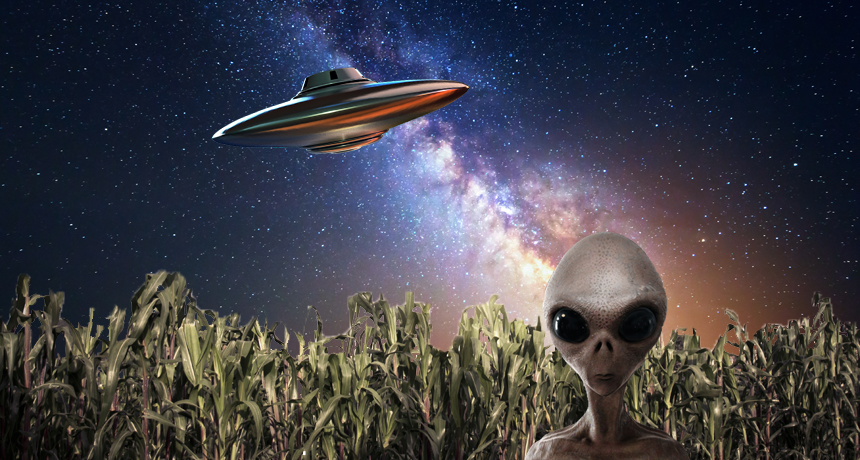Study Finds That Humans Would Welcome the Discovery of Extraterrestrial Life
Article by Gautam Peddada June 20, 2021 (collective-evolution.com)
• Researchers from Arizona State University have performed studies to find out how we humans will deal with it if we make contact with intelligent extraterrestrial life? Will we be terrified? Will we feel threatened? Will we be able to comprehend it? Will we accept it?
• On February 16th, ASU Assistant Professor of Psychology Michael Varnum presented the findings of the most recent study, “How Will We React to the Discovery of Extraterrestrial Life?” at the American Association for the Advancement of Science annual meeting in Austin, Texas. Varnum’s conclusion? “If we came face to face with life outside of Earth, we would actually be pretty upbeat about it.”
• A previous pilot study focused on people’s reaction to the discovery alien microbial life on Mars, the periodic dimming around Tabby’s Star, and other Earth-like exoplanets in a star’s habitable zone that could support life as we know it. The pilot study discovered that the language used to depict these events elicited much more positive than negative feelings.
• In a second study, the researchers invited over 500 people to write about their potential reactions to the discovery of alien microbial life ‘considering their individual sentiments as well as those of mankind as a whole’. Again, participants’ replies revealed substantially more positive than negative emotions. “I’d be a little excited about the news,” one participant remarked.
• Varnum’s ASU group gave an additional sample of over 500 people split into two groups. Group One participants read a previous article from The New York Times on probable evidence of ancient microbial life on a Mars meteorite. Group Two participants were given another New York Times article about the development of synthetic human-made life in a lab.
• The responses were considerably more positive about finding of microbial alien life than they were about developing synthetic life. With regard to other planets hosting life, one participant stated, “It’s an intriguing and fascinating discovery that might be only the beginning.”
• Varnum also examined recent media coverage that the interstellar ‘Oumuamua’ asteroid is actually a spacecraft. Here, too, Varnum discovered more positive than negative emotions, implying that humans may react favorably to news of the finding of sentient life elsewhere in the cosmos. “[T]aken together, this implies that if we find out we’re not alone, we’ll take the news rather well.”
 As the possibilities of a non-human intellect being present on Earth increase on a daily basis, one
As the possibilities of a non-human intellect being present on Earth increase on a daily basis, one

critical question must be addressed: How will we deal with it if we make contact? Will we be terrified if we feel threatened? Will we accept it? Will we be able to comprehend it? Or will we dismiss it as just another item to cope with in our increasingly fast-paced world?
Researchers from Arizona State University performed a study to try to find out the answer, and the article is titled “How Will We React to the Discovery of Extraterrestrial Life?”
The researchers looked at how language was used in media coverage of previous announcements of this kind, with an emphasis on alien microbial life (Pilot Study). A large online sample was asked to write about their own and humanity’s reaction to a hypothetical announcement of such a discovery, and another large online sample was asked to read and respond to a news article about the discovery of fossilised extraterrestrial microbial life in a Martian meteorite.
Martian meteorite.
 “If we came face to face with life outside of Earth, we would actually be pretty upbeat about it,” said Arizona State University Assistant Professor of Psychology Michael Varnum.
“If we came face to face with life outside of Earth, we would actually be pretty upbeat about it,” said Arizona State University Assistant Professor of Psychology Michael Varnum.
Varnum presented the study’s findings on February 16 at the American Association for the Advancement of Science annual meeting in Austin, Texas.
The pilot study’s articles focused on the 1996 discovery of possibly fossilised extraterrestrial Martian microbes, the 2015 discovery of periodic dimming around Tabby’s Star, thought to indicate the presence of an artificially constructed “Dyson sphere,” and the 2017 discovery of Earth-like exoplanets in a star’s habitable zone. The pilot study discovered that the language used to depict these events elicited much more positive than negative feelings.
FAIR USE NOTICE: This page contains copyrighted material the use of which has not been specifically authorized by the copyright owner. ExoNews.org distributes this material for the purpose of news reporting, educational research, comment and criticism, constituting Fair Use under 17 U.S.C § 107. Please contact the Editor at ExoNews with any copyright issue.
